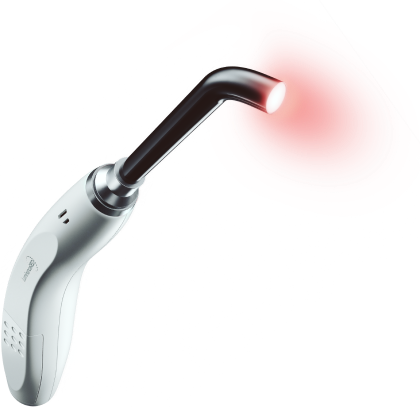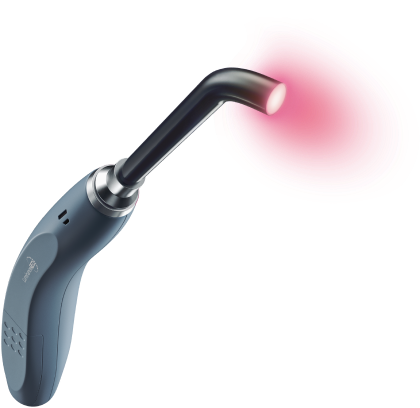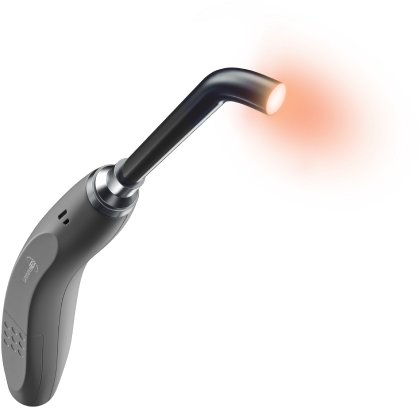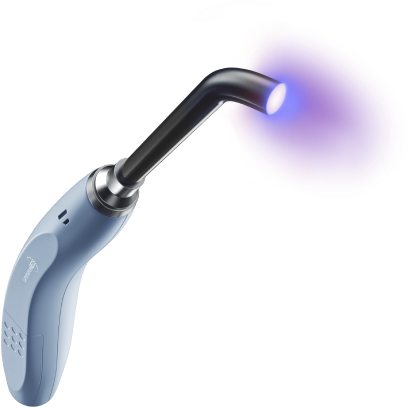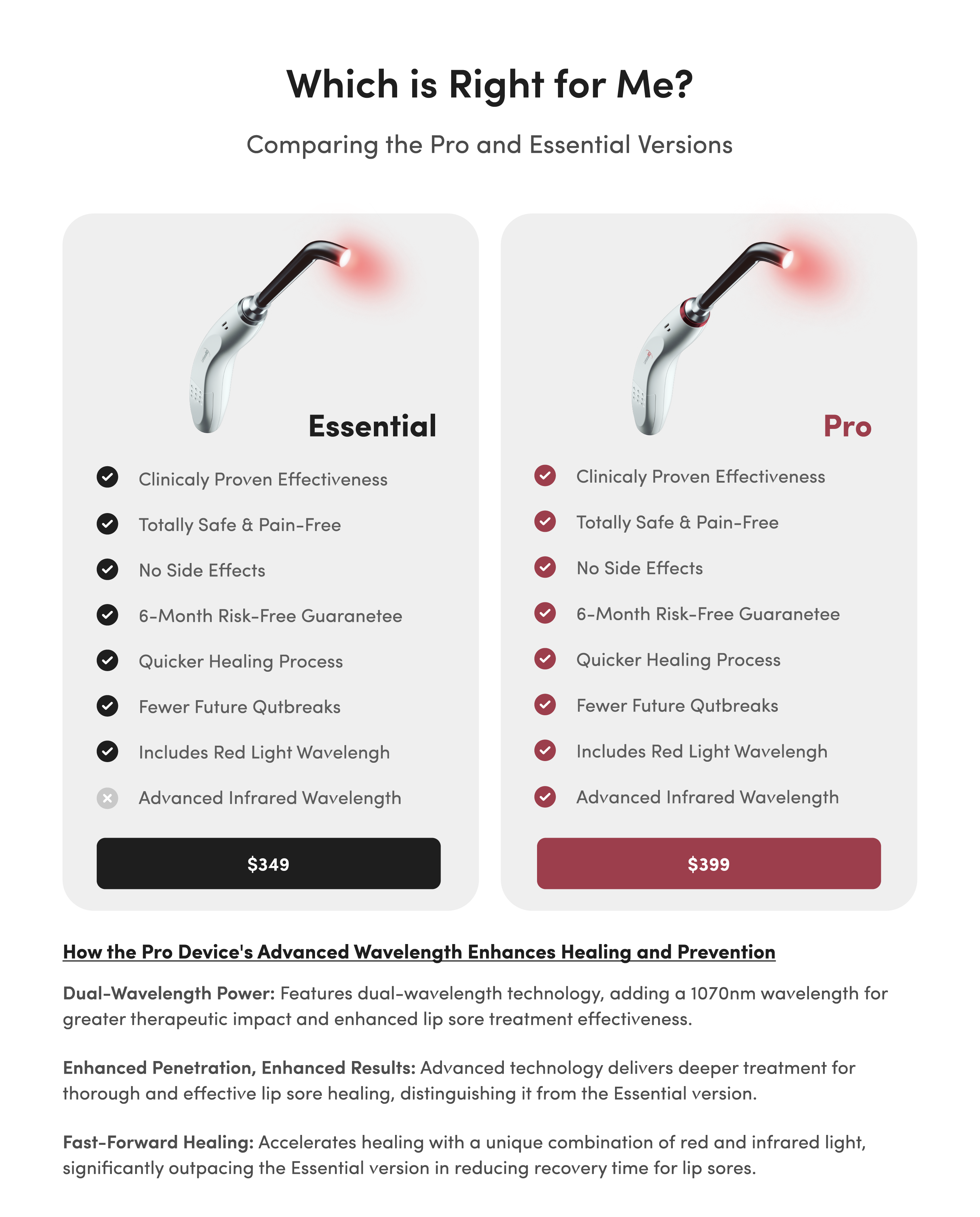Can You Get Canker Sores From Stress? Here's the Science

You already know how stress invades your body. In fact, you can recognize its effects from the moment they begin: a dull headache that morphs into a migraine; indigestion that becomes an ulcer; or perhaps a slight eye twitch that just won’t stop.
Is it possible that those painful and irritating canker sores around your lips and mouth are also the result of stress? Anecdotal evidence suggests that stress may be a significant canker sore trigger. Fortunately, you can learn how to take control of your stress and prevent canker sore outbreaks before they begin.
What Are Canker Sores?
Canker sores, or aphthous ulcers, are shallow white lesions with inflamed pink borders that occur inside the lips and mouth. The sores are typically 1-4 mm in size, but complex sores can be larger than 5 mm.
Though they are often confused with cold sores (Herpes simplex virus type 1 or HSV-1), canker sores are not contagious. Raw canker sores make it challenging to eat, sleep, and speak; even with traditional therapies, they often take weeks to heal.
Minor
Minor canker sores are the most common, accounting for about 80% of canker sore cases. These are small sores that cause some discomfort but no scarring. In most cases, minor canker sores heal within a week.
Major
Major canker sores, on the other hand, are less common and cause more severe side effects. These sores can last more than two weeks and grow to over 1 centimeter in diameter. Patients usually experience extreme pain and discomfort during major canker sore outbreaks.
Herpetiform
Herpetiform canker sores only occur in about 5% of people with canker sores. Small ulcers cluster together to form a much larger ulcer, but they tend to heal within a week.
The Most Common Canker Sore Causes
There’s no definitive cause of canker sores. However, many contributing factors are believed to trigger canker sores more frequently. The most common canker sore triggers include:
- NSAIDs (Motrin®, Aleve®)
- Smoking
- Vitamin deficiencies (low vitamin B12 or iron)
- Foods high in citric acid, such as oranges, tomatoes, and some cheeses
- Underlying autoimmune conditions (HIV/AIDs, Lupus, Behcet's disease)
- Chronic high stress or a traumatic life event
- A family history of canker sore outbreaks
- Viral infections or bacteria in the mouth
Teens and young adults are more prone to frequent canker sore outbreaks than others, but this condition plagues males and females of all ages.
Can You Get Canker Sores From Stress?
We all know that stress manifests itself in many different ways, even if clinical research can’t prove it definitively. Despite multiple studies, the medical community hasn’t yet confirmed that stress triggers the formation of canker sores. Anecdotal evidence provides the strongest proof of canker sores from stress.
Existing research suggests a high correlation between canker sores and anxiety, depression, and psychological stress. Experts don’t yet understand exactly why, but they theorize that people experiencing stress may indulge in behaviors that trigger canker sores, such as biting their lip and cheeks or eating acidic foods.
Stress Affects Your Whole Immune System
Stress weakens your immune system. It’s simple and complex all at once. When you experience physical, mental, or emotional stress, your immune system struggles to properly fight antigens and invaders. This is why you always seem to become more susceptible to infections and illnesses when you’re under intense stress.
It’s also possible that stress drives you to make unhealthy choices that you wouldn’t normally make during times of less stress. For example, stress often leads to drinking, smoking, poor eating habits, and lack of sleep.
Considering the serious implications of stress on your health, it’s easy to conclude that stress makes the body more vulnerable to canker sore outbreaks as well.
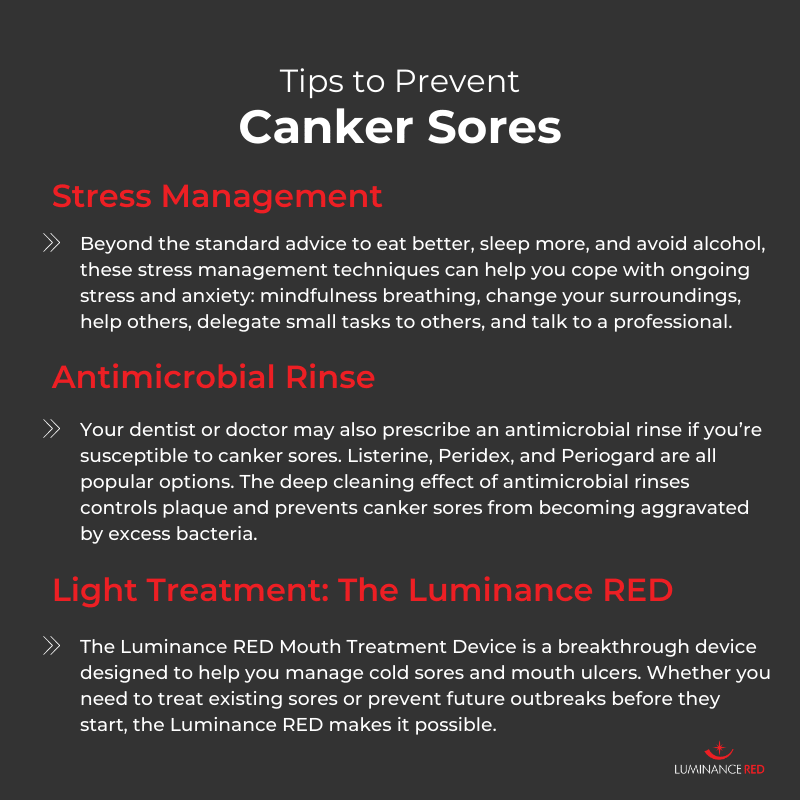
Tips to Prevent Canker Sores
You can’t eliminate stress from your life entirely, but you can take measures to reduce its impact on your health and wellness. Try a combination of stress management techniques and canker sore prevention tips for the best results.
Stress Management
Beyond the standard advice to eat better, sleep more, and avoid alcohol, these stress management techniques can help you cope with ongoing stress and anxiety:
- Mindfulness breathing
- Change your surroundings
- Help others
- Delegate small tasks to others
- Talk to a professional
Antimicrobial Rinse
Your dentist or doctor may also prescribe an antimicrobial rinse if you’re susceptible to canker sores. Listerine, Peridex, and Periogard are all popular options. The deep cleaning effect of antimicrobial rinses controls plaque and prevents canker sores from becoming aggravated by excess bacteria.
Treatment With Light: The Luminance RED
Canker sores can cause weeks of discomfort during and after the healing process, even with the help of home remedies. Treatment with high-powered, medically optimized light is a gentler, safer, and more reliable way to alleviate even your worst canker sores.
Research proves the profound effects of high-powered light for canker sore prevention and treatment. Many studies show that applying medically optimized light to canker sores significantly reduces pain. In one study, the group that received treatment immediately experienced a 92% reduction in pain versus a 1% reduction in the placebo group.
The Luminance RED Mouth Treatment Device is a breakthrough device designed to help you manage mouth sores. Whether you need to treat existing sores or stop future outbreaks before they start, the Luminance RED makes it possible.
When Is It Time to See a Doctor?
Most canker sores go away in time, and medical treatment is typically not necessary. However, more serious cases may require medical attention.
Consider seeing a doctor if your canker sore:
- Is unusually large
- Lasts longer than 10 days without any signs of healing
- Reaches your lip
- Causes fever and other symptoms
Though rare, recurring canker sores may be caused by a serious health issue. Your doctor can run tests to rule out other potential canker sore causes.









